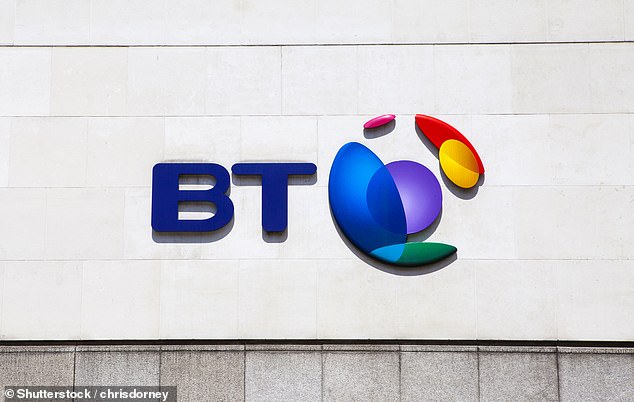Millions of households face paying up to 7.9 per cent more for their broadband and mobile phone deals as providers are soon set to bring in another round of crippling price hikes.
These mid-contract increases are set to take place from March to May and will see many broadband and mobile firms pass on cost rises linked to inflation – often with an extra charge on top for good measure.
The price rises are linked to December’s inflation figure, which was revealed today as 4 per cent, with the ONS saying CPI had risen slightly from 3.9 per cent the month before.
The changes mean mobile phone users will see rises of around £18 a year, with broadband customers paying an extra £36, BT said.
Regulator Ofcom is considering plans to ban these inflation-linked price increases from spring 2024, although not in time for this year.
That means mobile and internet providers are free to continue with the practice of increasing the price of their tariffs to consumers, even mid-contract.

If you can’t BT them: Britain’s largest telecoms firm is just one putting up its prices this year
Most providers base their price increases on December consumer prices index (CPI) inflation figures, which came out today.
The Office for National Statistics said CPI inflation was 4 per cent in December, up slightly from 3.9 per cent in November.
This is how the major broadband and mobile firms will change their pricing this year.
BT
BT phone and broadband customers whose contracts started on or after 1 September 2020 will see rises of inflation plus 3.9 per cent from March 31.
Customers who signed up before 1 September 2020 will see price rises of the level of inflation.
BT said the changes meant the average SIM-only and airtime customer would pay an extra £18 a year and the typical broadband customer an additional £36 per annum.
A BT Consumer spokesperson said: ‘Starting in early summer 2024 and ahead of the implementation of Ofcom’s final ruling, we will be introducing a pricing model aligned with Ofcom’s approach, moving away from a price rise calculation based on percentage figures and CPI, and instead offering our customers a predictable long-term view of their contract terms.’
EE
EE broadband and mobile customers will pay price rises of inflation plus 3.9 per cent from 31 March.
The terms are similar to those of BT, which bought EE in 2016.

Join the club: EE’s mobile phone and broadband customers will see price hikes in line with BT
Virgin Media O2
Virgin Media O2 is made up of two parts – Virgin Media, which handles broadband, and O2, for mobile phones.
Customers of either firm could see price rises this year, but will not know until February.
That is because Virgin Media O2’s price increases are tied to January 2024’s retail price index (RPI) inflation figure, which is published in February.
Most providers will use December 2023’s CPI figure, published today.
RPI is historically the higher of the two inflation figures, and Virgin Media O2 is the only telecoms firm to use it to set its prices.
TalkTalk
Most TalkTalk broadband customers will see rises of CPI plus 3.7 per cent from April.
A TalkTalk spokesperson said: ‘For 20 years TalkTalk has focused on delivering value for customers in the vibrantly competitive UK broadband market.
‘That’s why we’ve been calling on Ofcom to urgently review the inflation-linked annual wholesale cost increases that lead to these consumer price rises. The link between the consumer and wholesale price rises is obvious; it is essential that both are addressed simultaneously in order to protect both consumers and competition.’
Sky
Sky’s price rises are up to the firm and are not based on inflation levels.
Are all mobile and broadband deal prices rising?
No, though most will.
The main type of mobile and internet deal that does not go up in line with inflation is the social tariff.
These deals are not open to all, and are mostly restricted to those on benefits, lower incomes or the elderly.
A social tariff is a cheap deal only available to struggling households.
These cheap deals exist because since 2020 industry regulator Ofcom has demanded that providers give low-cost options to the most hard-up customers.
Another perk of social tariffs is there are no exit fees for leaving them before your term ends.
In their defence, broadband providers say their hands are tied to a certain extent when it comes to price rises.
Most broadband firms rely on Openreach’s infrastructure to deliver broadband to consumers’ homes, and pay the BT-owned firm a yearly fee.
That fee rises with inflation every year, in line with Ofcom rules, and broadband providers would argue their costs have to go up by at least inflation too.
Not only this, but the firms say that a third to a quarter of their customers see no price increases due to being on a social tariff, vulnerable or on certain fixed-rate deals.
However, the cost to supply these people with broadband still goes up every year in line with inflation, meaning firms look to pass costs on to other customers.
But these reasons – normally mentioned secretively by mobile and broadband firms – do not explain why many of their prices rise by significantly more than inflation.
Nor do they explain why the practice of adding a charge on top of inflation-linked rises is relatively new, with many providers only starting the practice in recent years.
Some links in this article may be affiliate links. If you click on them we may earn a small commission. That helps us fund This Is Money, and keep it free to use. We do not write articles to promote products. We do not allow any commercial relationship to affect our editorial independence.




